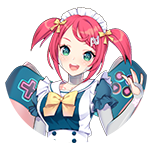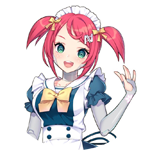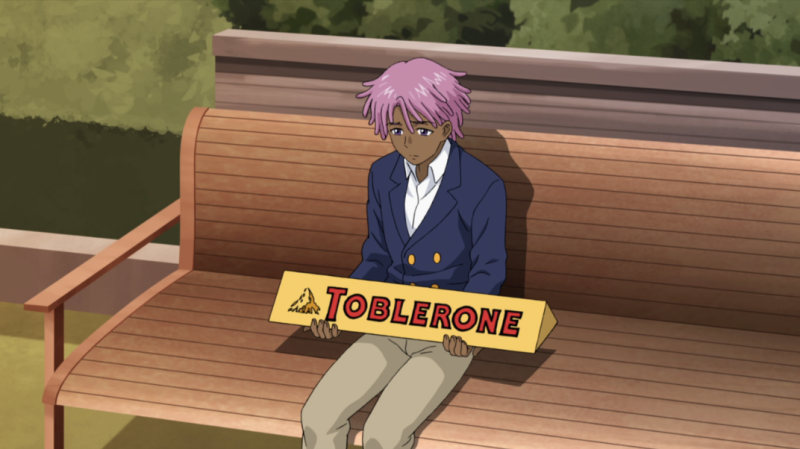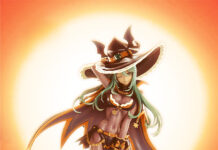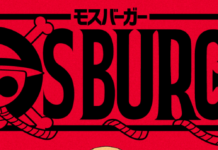Every once in a while, it’s nice to take a break from watching the high quality output of the Japanese animation industry to remind ourselves that, yes, bad anime still very much exists in this world. Neo Yokio is just such a show. Not even worthy of being damned-with-the-faint-praise of “so bad it’s good,” Neo Yokio is the anime equivalent of watching a train derail in slow motion…while a gas truck careens straight toward it…while an airplane goes down in flames at that exact same spot. Slight exaggeration. Slight.
To give credit where credit is due, Neo Yokio at least does try something new. To start with, the show isn’t really Japanese. Although directed by Kazuhiro Furuhashi (whose directorial credits include Ruroni Kenshin, Hunter x Hunter, and Gundam Unicorn, just to name a few), the show is written by Ezra Koenig, of Vampire Weekend, and voice acted by Jaden Smith and Jude Law, among other big names. Such a show, especially headed by a name like Furuhashi, sounds on paper like it would be too big to fail (presumably that’s how they got Netflix financing for the whole debacle), but the combined talents of Koenig’s writing and Smith’s voice acting manage to snatch defeat from the jaws of victory. And when I say “talent,” I mean the kind of talent it takes to get a gutterball when bowling with gutter guards.
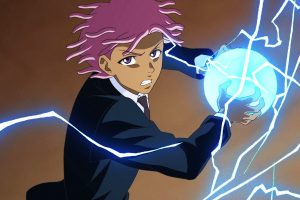
But let’s be objective for a second and at least give Neo Yokio the benefit of a proper summary. The show’s title is also its setting: a weird, off-kilter alternate reality of New York washed through an Asian filter (similar to, but infinitely worse than, Big Hero 6’s San Fransokyo). In this almost-but-not-quite New York lives Kaz Kaan, an aristocratic cockroach of a teenager who looks like Jaden Smith, but with pink dreads. Kaz is part of the city’s “Magistocracy,” a term plucked straight from work of middle school fan fiction, which describes a group of immigrants who were brought to the city centuries ago to deal with a pervasive demon problem. Yes, at least on paper, Kaz is a demon hunter, and a fairly talented one, we are lead to believe. However, neither Kaz, nor the show itself, seems particularly interested in this side of his life, preferring to focus on such pressing issues as: “can one wear a midnight blue tux to a black and white ball,” and “Is promoting a caprese martini too avant-garde for my personal brand image?” Kaz, a product of the environment in which he was raised, cares only for fine fabrics, expensive watches, and field hockey. In fact, Kaz spends most of his time obsessing over how to beat his arch-rival Archangelo to the top of the “Most eligible bachelor” leaderboard in Times Square. Yes. Neo Yokio is a world with a most eligible bachelor ranking board in an otherwise photorealistic Times Square. That alone should probably tell you all you need to know about this show.
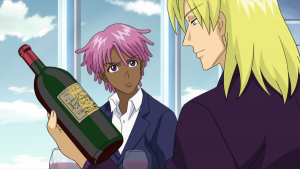
Funny enough, it’s details like this that make Neo Yokio so frankly unsettling. For a show whose title is a gear-crunching portmanteau of “New York” and “Tokyo,” the setting skews distinctly more New York…to the point where it might as well be New York in about…oh, 10 years or so. The anime art style of this show clashes horrendously with its almost-real-world setting, where characters do such real world things as wear real 1919 Cartier watches, shop at real-life Bergdorf’s, drive in real Rolls Royce Phantoms, eat real giant Toblerones, and wear real-life Chanel and Aaliyah clothing. These aren’t localization dubbing choices either: in any other anime, the characters would be drinking Ramune and calling it Coca-Cola, but in Neo Yokio they really are using the proper western products, and the effect is simply…jarring.
Back to the life of Kaz Kaan, however…we run into another problem, which is that Kaz simply has no life to speak of. Blue-blooded to the point where he will never have to work a day in his life, Kaz resents anyone who forces him to do his job of ridding the city of the demons that threaten it. Never mind that demon-hunting is his supposedly sacred duty, and the reason why he enjoys the posh lifestyle he is accustomed to. The sad thing is: when the writing actually lets Kaz fight a demon or two here or there, the show suddenly becomes interesting. Although Neo Yokio clearly lacks the budget to carry out the same kinds of extravagant fight sequences that one might expect from a Naruto or a Bleach, the demon battles are truly the only interesting part of the show, and the only ones that make Kaz seem even remotely tolerable as a human being. Sadly…with only 6 episodes for the show to tell its constrained story, the number of these battles can be counted on one hand.
Equally sadly, the supporting cast does nothing to make Kaz seem any less insufferable. BFFs Lexy and Gottlieb supposedly provide comic relief, and while it is refreshing to see a trio of headlining people of color in a mainstream anime, Lexy’s lines in particular (voiced by The Kid Mero) are bad enough to make a middle-schooler cringe. On the same subject, Jaden Smith himself manages to turn in a shockingly bad performance as Kaz; reading his lines with all the feeling and finesse of a teenager at the end of a 48-hour all-nighter. The only remotely likeable character of the recurring cast is fashion-blogger-turned-nihlist Helena St. Tessero (another middle school fanfic name), voiced by real-life fashion blogger Tavi Gevinson. Her total self-awareness and accurate assessments of Kaz’s vapidity make her a breath of fresh air in this stale show, but unfortunately the show somehow doesn’t want you to like her, or her completely accurate commentary on the vanity of capitalism, as evidenced by the fact that Kaz ultimately resolves all his problems without her help and goes back to living his same worthless existence at the end of each day. Robot butler Charles (Jude Law, doing his best watered-down Paul Bettany impression) also deserves honorable mention, for simply being a neutral character in a show with an overwhelming number of people to hate.
Other less-pressing-but-still-serious issues with the show include: the art style is proof that that special brand of bad 90s anime actually did survive the digital transition after all; the show has…well, I would call them dubbing issues, but English was this show’s first language, so I guess you have to call them some really bad takes in the voice acting department; the aggressively royalty-free soundtrack (Vivaldi has never been so maligned…); weird little bits of Japanese which make their way into the dialog (e.g., “Kaz Kaan the Ichiban” and “Hikkikomori,”) in a way that, again, sounds like how a middle schooler would have their original character speak; and finally the vulgarity of many of the characters is often jarring when one considers that they are supposed to represent a world of refinement.
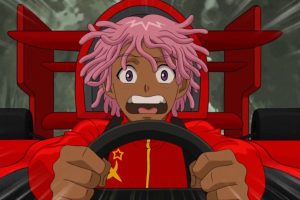
All of this boils down to the pressing question of the day: What the actual <bleep> is Neo Yokio?! The best answer I can come up with is: it’s a weirdly tone-deaf slice of life anime which dips its toes into way, way too many genres, never staying long in any of them before returning to a baseline of vapidity that is neither interesting, sympathetic, nor even particularly adept at the social commentary that obviously lies somewhere beneath the surface. It is a show that is crass when it should be solemn, frantic when it should be tranquil, and cringeworthy when it should be humorous, all of which leads me to my final question, which I will leave you, dear readers, to ponder:
Why the hell did Kazuhiro Furuhashi even allow himself to be associated with this trainwreck (cum truck crash, cum plane crash) in the first place?
